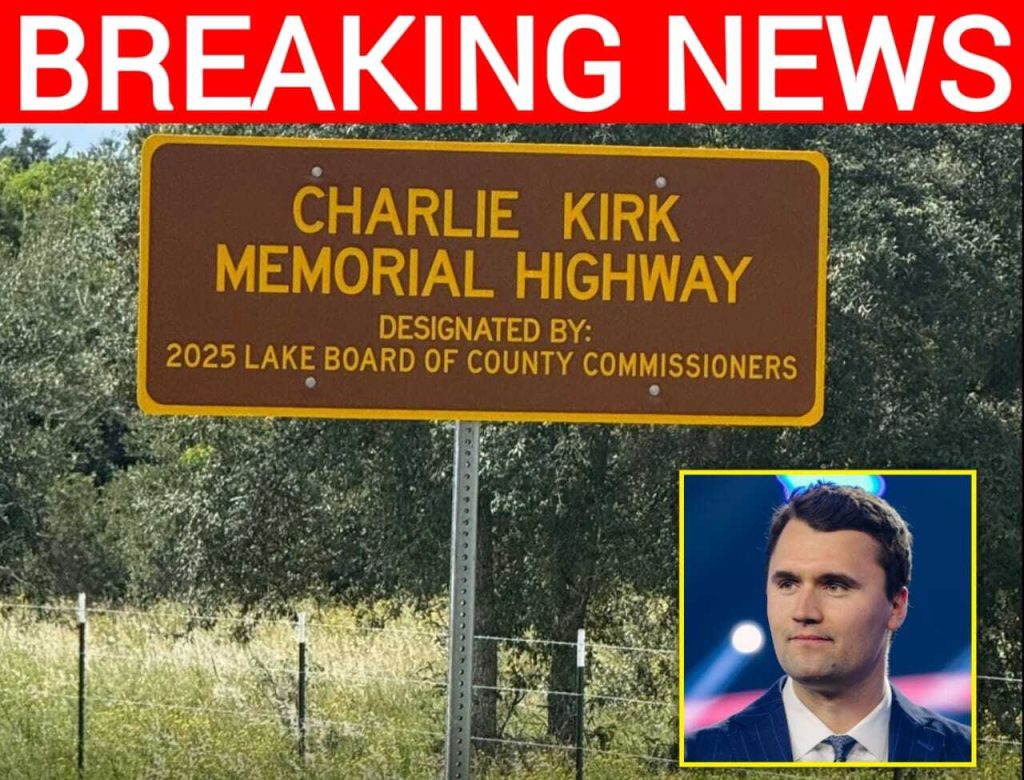Lake County, Florida Dedicates “Charlie Kirk Memorial Highway” Weeks After His Assassination, Marking the First U.S. Road Named for the Conservative Activist
In a moment that reflects both the tragedy of recent weeks and the legacy of a polarizing figure, Lake County, Florida has officially unveiled the nation’s first highway named after Charlie Kirk. A stretch of Schofield Road will now forever be known as the Charlie Kirk Memorial Highway, following a unanimous 5-0 vote by the county commission in September 2025. The decision was made quickly after Kirk’s shocking assassination on September 10, 2025, when he was gunned down during a speech at Utah Valley University. His sudden death, which sent shockwaves through the political landscape, prompted an outpouring of tributes from across the country.

The bright brown and yellow sign marking the new highway stands as a visible reminder of how swiftly communities can move to preserve a legacy. Kirk, who founded Turning Point USA in 2012, had become one of the most influential voices in youth conservatism over the last decade. He built a national platform around campus activism, voter engagement, and unapologetic messaging that resonated strongly with younger generations of conservatives. While his critics often accused him of prioritizing provocation over policy, his supporters saw him as someone who spoke directly to a group long ignored by the political establishment.

The speed with which the Lake County commission acted to name the highway reflects the urgency many of his admirers felt in wanting to honor him. In less than three weeks after his passing, the county had already placed his name on a road, a permanent memorial that ensures future generations will ask about the man behind the sign. It also underscores how deeply his presence was felt in Florida, a state that had become central to conservative politics during his rise.
Reactions to the dedication, much like reactions to Kirk himself, have been sharply divided. On one side, many conservatives online praised the decision, sharing the photo of the sign with words of respect and gratitude. To them, Kirk’s contributions to shaping conservative youth culture, his relentless organizing, and his high-profile role in national debates warranted such recognition. They see the memorial as a fitting tribute to a man who dedicated his life to political activism from an unusually young age.

Others, however, questioned the choice, arguing that roads and highways have historically been named after presidents, veterans, and long-serving community leaders rather than contemporary activists. Some critics framed it as a symptom of a growing trend of honoring influencers and political figures in the heat of the moment, before history has had time to measure their true legacy. The polarization mirrors the kind of debates that Kirk himself often sparked during his life, where his bold style drew admiration and scorn in equal measure.
Still, there is no denying that the Charlie Kirk Memorial Highway has already become a symbol. It represents not only the loss of a young activist whose life ended violently in Utah, but also the enduring mark he left on American politics. The sign standing tall along Schofield Road is more than just a piece of metal with words—it is a reflection of the ongoing conversation in America about who we honor, why we honor them, and what legacies are preserved in our public spaces.
For those who admired Kirk, driving down that highway in Lake County will now carry a sense of remembrance and pride. For those who disagreed with him, it may remain controversial. But one thing is certain: the highway ensures that Charlie Kirk’s name will remain visible, etched not only in the memories of those who knew his work but literally on the roads people travel every day. In that way, his story continues, woven into the landscape of Florida and into the ongoing debate about the role of activism, influence, and legacy in American life.


